To believe in democracy is their best
and last option in Burma
Conversation
with Moe Thee Zun
By May Ng
MN: What is Daw Aung San Su Kyi's option in the current political
process?
MTZ: The
space given to her by the regime is very narrow. She has only a few options:
those are--to register her party and to join an interim election. I don’t
know what is her final decision, on joining an election? But some of us are
concerned that her decision to join an election under the 2008 constitution
would perpetuate the military rule.
MN: What makes you think there is a small opening
of political space inside Burma?
MTZ: The
reason the regime is giving a tiny piece of bread to us is because
of various pressures on them. These include political instability,
economic problems and international pressure. Indeed, there is not
enough space to maneuver for the "huge-crisis-elephant" of Burma.
The issues of freedom of political prisoners, military offensives against the
KIA and ethnics areas, civil rights, and the monopolized market are not
included in the political process and are not on the top agendas in the
meetings of the so-called parliament. These crises need to be solved
urgently.
I
only notice changes in limited aspects, such as members of the regime are
talking with and taking photos with the lady. Some people return home
from abroad for lack of vision but without concrete wisdom on Burma’s
future.
MN: How
long do you think the small opening will last?
MTZ: It
will last or burst out depending on their understanding of DASSK or their
ability to defuse the economic time bombs. Households
in Burma rely on their family members in foreign countries such
as Thailand, Malaysia, Japan, the EU and North
America for their major sources of income. There are over four
million Burmese migrant laborers in Thailand and over thirty thousand
in Japan. When recent natural disasters hit in the respective
countries, they lost their jobs. These events make significant impacts
to Burma as well. I urge that U Thein Sein should move forward
on the current track and not backward. He should not copy from his
predecessors’ game of bad cop-good cop and time buying.
MN: What can international governments and the USA do to create a longer lasting and more meaningful cooperation from the Burmese government?
MTZ: The US plays
a very important role in Burma. According to our network analysis,
the majority of rank and file members of the army are not happy
with Burma's relation with China. The new government led by
Thein Sein and its relations with China are at its apogee when he
declared unilaterally to stop the huge dam project on the Irrawaddy river. China believes
that it is from the US pressure on the regime, while in reality
the US is occupied with its own financial crisis and the Arab
spring.
I
believe that the US must maintain its relationship with the military.First,
by upgrading the U.S diplomatic relations from the charge d' affaires to the
Ambassador Levels.
And
to continue targeted sanctions against the generals who are hard liners in the
army such as Tin Aung Myint Oo, Kyaw San, Than Shwe, Maung Aye, Aung Thoung and
U Thoung, and their relatives and their cronies. And, to ease the
sanctions against Thein Sein, Aung Min and Shwe Man.
The US should
also take measures against the Burmese, who are US citizens with financial
connections with the hard liner generals. (We can provide their lists .)
And
the US can bring effective charges against the generals and cronies
who are involved in drug trafficking and money laundering, such as Htun Myint
Naing, Moe Aung (son of Aung Thoug), Max Zaw Zaw.
MN: What should the young people inside and outside of Burma do to make sure that they will have democracy in the future?
MTZ: Young
people need more education, exposure and advanced study. We should provide what
they need. We should make education programs for democracy and human-rights
that are in line with their needs.
MN: How
should Burmese politicians prepare themselves to establish peace with ethnic
nationalities in a democratic Burma?
MTZ: First,
we need to compile information about what is going on in the ethnic areas –
finding facts on their sufferings, the ruins, and lost of lives from fifty
years long civil war complete with reports, photos and video. We should
have a common website about Burma’s ethnic areas in Burmese and English
languages.
Second,
we must be able to explain how a federal union like the U.S model has benefits
for all nationalities and different religious groups.
Third,
politicians should not use Burmese nationalism and Buddhism as a tool to retain
power. I do notice that many activists and leaders are still silent on the
ethnic issues. They talk more about Buddha but there is less talk
about freedom and human rights for all. They talk more about the obedient
Burmese culture but less about liberal values and norms. It is not a
coincidence and it is ignorance to leave out these issues.
MN:
How should ethnic nationalities participate in the debate about Burma’s
future?
MTZ: I
encourage them to speak aloud about a federalism that does not split away their
regions from Burma. They should cooperate with the majority of Burmese who
are willing to support their movements. In a Burma under a
Federal Government in the future, they can get their own states,
practice their own cultures and languages and manage their own local
governments. There will be two types of governments - federal and
local. Federal government would take responsibility for foreign affairs,
defense, monetary policy, environmental policy, and national health and
education policy. At the Local level, there will be government,
elections and local management of business, local needs and resources in
collaboration with the federal government.
MN:
What is the biggest mistake of Muammar Gaddafi and Saddam Hussein?
MTZ: Failure
to transform a resources-based power to democracy and growth for the people.
Their powers were based on natural resources and while they were in power, they
did not share power with the people.
MN: What do you think is the best option left for the Burmese military now?
MTZ: To
believe in democracy - that is their best option, and the best way to create
prosperity for their lives, their families and their army. Democracy can
provide mutual benefits for all and secure a future for every single citizen
in Burma.
Now
is good time for the military to give up narrow minded Burmese nationalism and
move forward with democratic nationalism – by respecting each others and
different views. They should not copy models
from Russia, China and Malaysia, where they are exercising
an autocratic model of societies which have parliaments press, elections and
business, but no real democracy. Models of autocratic regimes have
brought some prosperity to certain parts of the society; however, they promise
failure when societies reach challenging points such as demographic changes,
limited resources, and external impacts.
The
military must learn a lesson from Gaddafi and Saddam. The faith of leaders in
the Burmese army is similar to Gaddafi and Saddam who tangled with religions
and nationalism in their utopian dreams. The generals
in Burma use similar formula to build a Burmese way to utopia in what
they label as “guidance democracy.”
MN: Do you think the Burmese junta is capable of change?
MTZ: Very
good question. I don’t think they have the capability to
change. Why? Burma is the only country in South East
Asia that has no single independent newspaper or a theater or a baby
diaper or feminine pads factory. That means that the regime is not
interested or not aware of the intellectual needs of the people or the needs
for basic goods and services for the general public. It has been this way for
sixty years from Ne Win to now, Thein Sein. It only means that the
junta has no capability to handle economic and human development or deal with a
crisis like Nargis storm.
In
the past few days, some MPs in parliament discussed an agenda item regarding a
sufficient future water supply system for Rangoon residents.
The majority of MPs from the USDA (a military backed organization like the
Brown shirts of the Hitler regime) voted against the plan.
It
is almost too late. Everyone in Burma is on tenterhooks with their
formula of change. The barrel of a gun alone cannot create power in this era of
globalization. Power comes from democracy, a healthy economy and
technology.
MN: Is Burma similar to Syria or Libya?
MTZ: The
nature of crisis in Burma is similar to that
of Syria or Libya - countries with rich resources, poverty,
corrupted regimes that mix narrow nationalism, socialism and religions.
However, geopolitics is different. For example, Libya has huge oil
fields, but was less friendly in international politics and isolated, and where
wide open terrain invited an unwelcome friend - NATO.
For Syria it is more like Dr Jekyll and Mr Hyde, the dual character
in the novel by Robert Louis Stevenson. It plays both a peacemaker and a
problem maker for the stability of the region and it has both friends and
foes. It is led by a dictator who has no problem with killing protesting
citizens. In advance of geopolitics, Syria takes advantage to
minimize applications of Western power. In that point, Burma is
similar to Syria, still narrowly maneuvering among global powers.
However, it will not benefit in the long run to sustain its position between
two giants - the U.S and China.
MN: What
do you think is the next step Burmese citizens can take?
MTZ: Citizens
are expecting positive outcomes from the new government, such as jobs, electric
service, energy, improved food supply, education, trading, and health care.
They are not talking about democracy yet. They are struggling for a piece of
food in the markets. Once parliament goes in the opposite direction from
citizen demands or neglects to keep their promises, the Big Game will be shown
not on the silver screen, but in the streets. It may not be that far off.
They know that 49 years is enough time to make a market, a theater, a
newspaper, and a factory for baby diapers and feminine pads.
Finally,
as international focus on political prisoners is ramping up, at the very least
U Thein Sein’s government should work toward improving the inhumane treatment
of political prisoners. They must move the political prisoners back to local
prisons. 8888 Generation Student leaders should be sent back to Insein Prison.
Political prisoners should have access to each other and broadcast news and
information. They also should be treated humanely and be allowed basic
necessities and accommodation.





















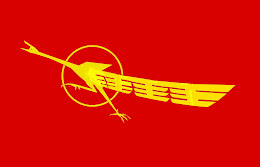





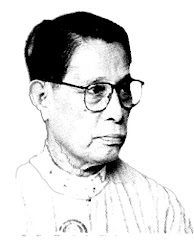


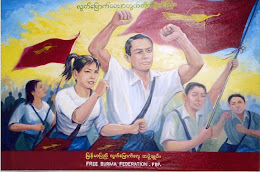





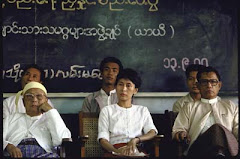

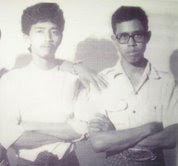

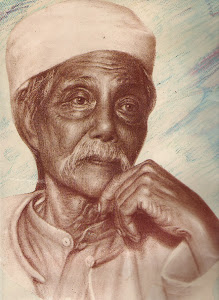
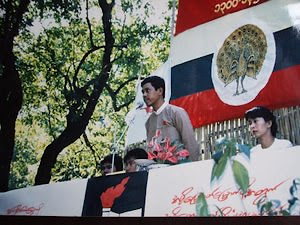
1 comment :
there are baby diaper and feminine pad factory in hlaing tha yar sicne 2002. study before you accused ko moe thee
Post a Comment